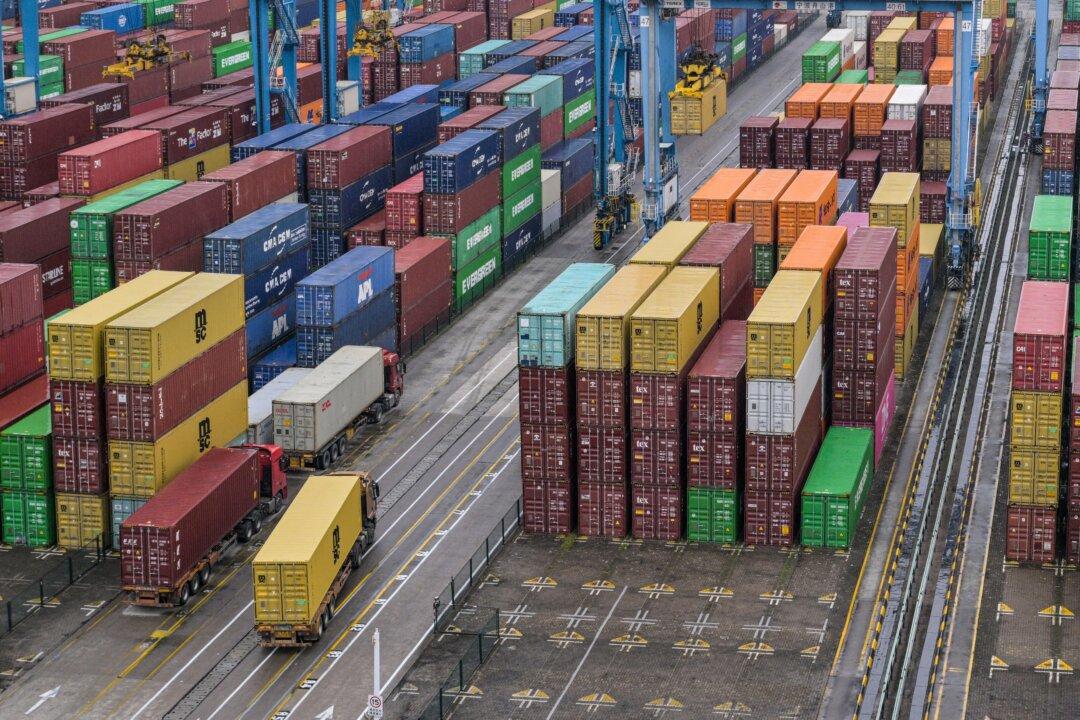Commentary
China has a $1 trillion trade surplus, and the United States has a $1.2 trillion trade deficit. Since 2022, China’s exports have grown by more than 30 percent, while its imports have remained flat. Beijing aims to become economically self-sufficient while controlling key international commodities, such as rare earth elements (REE).
Where China lacks a resource, such as oil, gas, and semiconductors, the regime in Beijing seeks to conquer territories such as Taiwan and the South China Sea that have these assets in spades. China, under the Chinese Communist Party (CCP), epitomizes what ought to be considered a predatory state.
The Chinese people are not bad. Their main fault is allowing themselves to be taken over by a predatory political party. China’s growing trade surplus is possible because Chinese citizens tend to be savers, to the point of deflation. Americans, on the other hand, tend to be spenders, to the point of inflation. Beijing also subsidizes its industry and engages in other unfair trade practices, such as dumping.
The result of this, along with China’s relatively cheap labor and lack of environmental regulations, is that China’s industry is booming at the expense of the rest of the world. The negative effects are borne not only by the United States but also by the United States’ European and East Asian allies.
The United States has a trade deficit because people all over the world want U.S. dollars. They export real things to the United States in exchange for U.S. paper money. They save those dollars for a rainy day, invest them in U.S. Treasurys, or invest them in immovable U.S. assets such as real estate and companies. They want the dollars because they rightly believe that the U.S. dollar will hold its value, in part because the United States is a good place to invest. Property rights are, after all, enshrined in the U.S. Constitution.
The opposite is true in China. Communists feel free to ignore their constitution and take private property whenever they want. For this reason, there are billions of dollars worth of capital flight from China every year. In 2024, net foreign direct investment outflow was $168 billion. In 2022, capital flight was estimated at $372 billion.
If the opposite were true—if China, rather than the United States, were a good place to invest—then China would likely run a trade deficit because many people would want yuan to buy Chinese real estate, companies, and debt. The United States would export real stuff to China in exchange for yuan. That’s not true because everyone knows that China is a risky place to invest.
That the United States is a good place to invest—and China is a bad place to invest—is a good thing for the U.S. economy and U.S. national security. People and capital gravitate toward the United States, making Washington a more powerful global advocate for market democracy.
While trade deficits are not always bad, especially with allies, the same is not true when dealing with an adversary country such as communist China. The CCP attempts to supplant U.S. industry through its trade and monopolize key goods, such as REE, to use as leverage against the United States. Beijing is not a good-faith actor as an international trade partner. The United States and allies buy so many cheap Chinese goods as to risk permanent dependency, all while funding China’s military expansion that could one day be used to defeat U.S. and allied soldiers.
China’s dominance in REE refining allows the CCP to leverage us on other matters, such as admitting China’s students to absorb cutting-edge U.S. science and technology at U.S. universities and then transferring it to China. The CCP has demanded this since the opening to China by President Richard Nixon, and it still gets it despite reneging on its long-past promises of democratic and market reforms.
Giving away so much to China for nothing is empowering the CCP, so it has the cash and technology on hand to build a military that could soon outcompete ours in Asia, if not globally. So tariffs on China make sense from a national security perspective.
But if the United States is the only country that imposes tariffs on China, then China will simply divert its exports elsewhere, for example, to Europe, Japan, South Korea, Africa, and Latin America. To contain the CCP’s aggressive approach to trade and territorial expansion, the United States cannot embrace isolationism. Washington must lead other countries into joint and coordinated tariffs and sanctions against China.
One of the demands the United States can make in trade negotiations with other countries is that if they want tariff-free access to U.S. markets, then they must mirror U.S. tariffs on China. This would help innocent Chinese citizens and go a long way toward limiting the CCP’s growing international trade and political influence, even though the CCP could still reorient China’s manufacturing to Chinese consumers.
China’s growing $1 trillion trade surplus shows why global taxes on China make sense: Beijing is not a good-faith participant in peaceful and democratic free market liberalization. The CCP is closer to an unaccountable and global megacorp with a captive population and nuclear weapons—something that approaches the enslavement of more than 17 percent of the world’s population—and counting if Beijing gets its way in Taiwan.Global tariffs could be considered a sin tax for doing business with the CCP, a partial sanction, or an economic corrective to the regime’s nonmarket approach to global trade. However one wants to define it, tariffing and sanctioning China, which exports authoritarianism by acting as a market of last resort for rogue states such as Russia, Iran, and Burma, makes political and economic sense. Failing to take such actions could allow the CCP to grow and become more powerful. The longer we wait, the harder it will be to decouple and correct our past mistakes.





